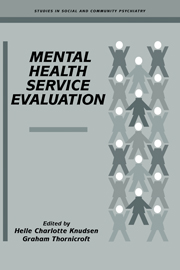Book contents
- Frontmatter
- Contents
- List of contributors
- Foreword
- Preface
- Part I INTRODUCTION
- Part II COMPREHENSIVE SERVICE EVALUATION PROJECTS
- Part III METHODS: MEASUREMENT, STRATEGIES AND NEW APPROACHES
- 8 Strategies of measurement and analyses
- 9 Experimental and quasi-experimental design in evaluative research
- 10 An informal introduction to graphical modelling
- 11 Meta-analysis
- Part IV SYSTEM-LEVEL RESEARCH
- Part V PROGRAMME-LEVEL RESEARCH
- Part VI HEALTH ECONOMICS IN MENTAL HEALTH
- Index
8 - Strategies of measurement and analyses
from Part III - METHODS: MEASUREMENT, STRATEGIES AND NEW APPROACHES
Published online by Cambridge University Press: 05 August 2016
- Frontmatter
- Contents
- List of contributors
- Foreword
- Preface
- Part I INTRODUCTION
- Part II COMPREHENSIVE SERVICE EVALUATION PROJECTS
- Part III METHODS: MEASUREMENT, STRATEGIES AND NEW APPROACHES
- 8 Strategies of measurement and analyses
- 9 Experimental and quasi-experimental design in evaluative research
- 10 An informal introduction to graphical modelling
- 11 Meta-analysis
- Part IV SYSTEM-LEVEL RESEARCH
- Part V PROGRAMME-LEVEL RESEARCH
- Part VI HEALTH ECONOMICS IN MENTAL HEALTH
- Index
Summary
Introduction
‘Strategy’ means ‘the science or art of military command as applied to the overall planning and conduct of large-scale combat operations’ The definition orients us to useful aspects of our war on mental illness, and in particular the evaluation of success in that effort. It suggests the value of overall planning in the face of a variety of alternatives. Inclusion of the idea of ‘combat’ emphasises the need for continuing energy and vigilance. The definition allows for the rationality of science or the intuition of art to be used in the work. In this chapter the notion of strategy is applied to the issue of measurement in the evaluation of community psychiatric services. It is important to note that ‘services’ is in the plural form. This form appropriately indicates that evaluation of an individual treatment service is not the focus - rather the focus is on evaluation of the service system. The focus is appropriate because the psychiatric service system is so fragmented that evaluation of a single service unit is rarely likely to be very useful. Much of the discussion will concern choices to be made, and alternatives to be avoided, given the strategic focus.
Strategies of measurement include three separate issues. First, there is a need to decide what content should be measured. Second, we must choose how to measure the chosen content. Third, there must be a technology to evaluate the success or failure of the measurement process itself. After a presentation of these three issues, there is a discussion of several strategic choices that must be made in designing measurement and analysis systems.
The content of measurement in the evaluation of mental health services
Measures can be applied at levels smaller than or greater than the individual human being. For evaluation of mental health services, the content of measurement can be divided roughly into outcomes at the level of the individual, and at the level of the service system. For the task of system evaluation, service outcomes are more important than individual outcomes. Also, other chapters of this book will focus in appropriate depth on individual outcomes. But it is useful to review both domains in order to guide and justify the strategic choices.
- Type
- Chapter
- Information
- Mental Health Service Evaluation , pp. 121 - 142Publisher: Cambridge University PressPrint publication year: 1996
- 8
- Cited by



